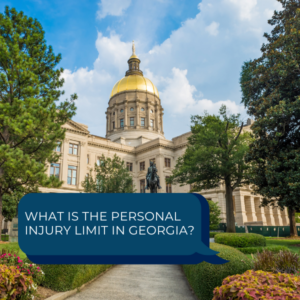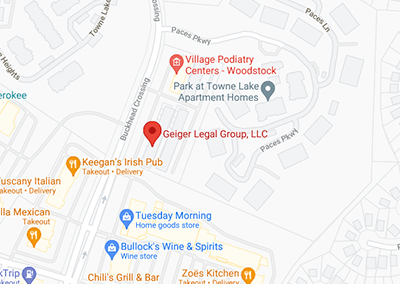What is the Personal Injury Limit in Georgia?

In their initial consultation at our personal injury law firm, clients often ask, “How much is my personal injury case worth?”
The answer is, “It depends on several factors.” Often, the at-fault party’s insurance company is responsible for paying a claim on behalf of their client, so in some cases, the settlement could be limited to the policy maximum.
Let’s explore other considerations that could affect your Georgia personal injury case.
What Is a Personal Injury Limit?
Personal injury limits may refer to a few different things.
First, some states limit the damages that can be recovered in different kinds of lawsuits. Previously, Georgia set a limit on non-economic damages, which compensate injured parties for the intangible harm they’ve suffered, like pain and suffering. However, the state’s Supreme Court ruled the cap unconstitutional.
Another limit involves time: the statute of limitations to file a suit in Georgia courts. This is the length of time the law permits you to file a lawsuit. If you fail to file a suit within the proscribed time limit, which in Georgia is two years (O.C.G.A. § 9-3-33) from the date of the accident, then you essentially forfeit your right to sue.
Another limit on personal injury cases is the policy coverage limit. For example, Georgia drivers are required to carry a minimum amount of liability insurance:
- $25,000/accident coverage for property damage
- $25,000/person and $50,000/ accident coverage for bodily injury
If another driver hits you, your settlement may only be the maximum coverage of their auto insurance policy.
Other types of insurance may have different limits. Let’s look at a couple more examples:
- A neighbor’s dog bites you. You may file a suit to seek compensation for your injuries and trauma, which, if successful, would be paid by that person’s homeowners’ or renters’ insurance policy. Your settlement may be limited by the limits of that policy.
- You suffered medical malpractice in Georgia. In this case, the various malpractice insurance policy limits of all liable parties could affect your settlement limit. Your personal injury lawyer can provide more specific details if this situation applies to your case.
Georgia’s Specific Limit
In 2010, the Georgia Supreme Court determined that the cap for non-economic compensation (losses like pain and suffering, diminished quality of life, or loss of companionship) violated the state’s constitution (Nestlehutt v. Atlanta Oculoplastic Surgery, 691 S.E.2d 218 (Ga. 2010).
Implications for Accident Victims
Several factors affect the compensation amount your personal injury attorney may seek on your behalf. The type of accident, your concrete losses (economic compensation), and the degree to which the accident negatively affected your life (non-economic compensation) all play a role in the final settlement amount.
What to Do if Your Damages Exceed the Limit
If your losses exceed the defendant’s insurance policy limit, you have a couple of options. You could file a suit against them directly, bypassing the insurance company and seeking compensation paid from their personal assets. Or, if the defendant has an “umbrella policy,” then that policy could cover the difference between the primary policy and your final settlement award.
Do You Need Help Seeking a Personal Injury Settlement?
Contact the Geiger Legal Group, LLC today for a free consultation with a compassionate, experienced Georgia personal injury lawyer. We can protect your interests and seek the maximum compensation for your losses.














